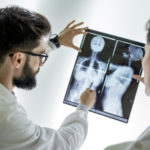Preparing For Breast Cancer?
Is it true that doctors can now predict when a woman with a BRCA gene mutation will develop cancer?
Andrew Weil, M.D. | October 2, 2017

New research has given us valuable information on when women who carry mutations in their BRCA1 or BRCA2 genes are most likely to develop breast or ovarian cancer. These genes normally act as tumor suppressors, but mutated versions of them promote cancer development. It is estimated that between five and 10 percent of all cases of breast cancer stem from inherited mutations of BRCA1 or BRCA2.
Until now, all we’ve known about the cancer risk is that it ranges from 40 percent to 87 percent for women with mutations in BRCA1 and from 27 TO 84 percent for those with mutations in BRCA2. As for timing, we’ve known only that women with the genetic mutations are likely to develop breast cancer by age 80.
A study published in June 2017 tells us much more. It found that the breast cancer risk peaks between ages 30 to 40 for women with BRCA1 mutations and between ages 40 to 50 for BRCA2 carriers. These new findings give women and their doctors a better idea of when to take protective action – such as surgery. The study also found that about 72 percent of women with BRCA1 mutations will develop breast cancer by age 80 and 44 percent of them will develop ovarian cancer by that age. For those with BRCA2 mutations, the study established that 69 percent will develop breast cancer and 17 percent will develop ovarian cancer by age 80.
To reach these conclusions, researchers from the U.K., the Netherlands, France, the U.S. and Australia recruited 9,856 women from the U.S., Australia, Canada, New Zealand and Europe with mutations in BRCA1 and BRCA2 as determined by testing in cancer genetics clinics. All told, 6,036 of the women had BRCA1 mutations and 3,820 had BRCA2 mutations. When they entered the study 5,046 of the women had neither breast nor ovarian cancer, while 4,810 had one or both.
After following the women for five years, the researchers also found that risks of developing cancer by age 70 were twice as high for women who had two close relatives – a sister, mother or aunt – who had the disease compared to those who had no affected close relatives. (The study also found that the specific location of the genetic mutations in the BRCA1 and BRCA2 genes influenced risk. Results also showed that within 20 years of an original breast cancer diagnosis, 40 percent of the women with BRCA1 mutations developed the disease in the opposite breast; this occurred among 26 percent of the BRCA2 carriers.
Most women, and the vast majority of women who develop breast cancer do not have BRCA mutations. However, if you have a family or personal history of breast or ovarian cancer, experts advise being tested for the mutations.
Andrew Weil, M.D.
Source:
Antonis C. Antoniou et al, “Risks of Breast, Ovarian, and Contralateral Breast Cancer for BRCA1 and BRCA2 Mutation Carriers.” JAMA, June 20, 2017, DOI: 10.1001/jama.2017.7112












